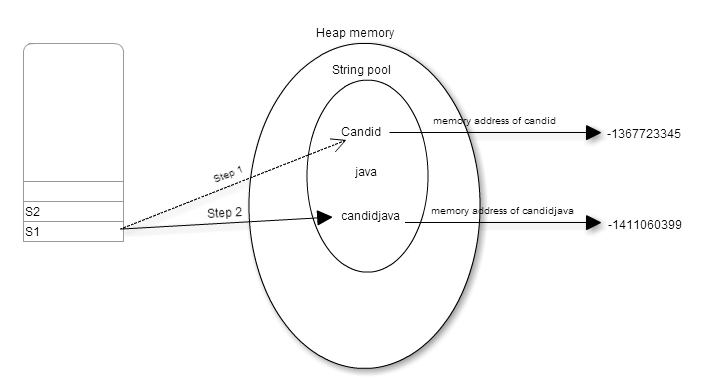Checking Out the Advantages of Unalterable Strings in Modern Programming Paradigms
In the realm of modern-day programming paradigms, the concept of unalterable strings stands as a keystone of robust software application growth. By embracing unalterable strings, developers can ensure boosted information honesty, enhanced string safety and security, streamlined debugging processes, increased safety and security procedures, and efficient performance optimization.
Improved Information Integrity

By preventing the alteration of string objects, immutability removes the risk of unintentional changes to the data they hold. This not just boosts the safety of the information but likewise enhances the dependability of the code that relies on these strings.
Immutability likewise sustains much safer multithreading environments, as concurrent access to immutable strings does not posture the danger of information corruption through simultaneous alterations. This property simplifies the procedure of taking care of strings in identical shows scenarios.
In significance, immutability functions as a safety guard around the information saved within strings, improving their honesty by ensuring that once specified, their worths continue to be unmodified throughout the program's implementation.

Enhanced String Safety
Unalterable strings improve the string safety of programs by guaranteeing that as soon as a string object is developed, its value can not be customized. This building gets rid of the danger of concurrent strings trying to modify the very same string simultaneously, which might result in information corruption or irregular states in the program - Why are strings immutable in Java?. In a multi-threaded atmosphere, where several strings access and manipulate data all at once, the immutability of strings provides a level of safety by ensuring that the data remains the same throughout its lifecycle
Streamlined Debugging Processes
Provided the improved thread security helped with by immutable strings, a significant advantage occurs in the realm of streamlined debugging processes. Immutable strings, as soon as developed, can not be modified, making it much easier to map the flow of information and recognize the source of insects in a program. This immutability ensures that strings stay regular throughout the implementation of the program, decreasing the chance of unanticipated changes that could result in errors.
When debugging with mutable strings, designers frequently come across concerns where a string's worth is changed unintentionally, making it testing to determine the root reason of a pest. Nevertheless, with immutable strings, the data stays unmodified, enabling designers to concentrate on examining the real reasoning of the code as opposed to locating where and when a string was changed improperly.
Furthermore, immutable strings streamline the debugging process by making it possible for much easier recreation of pests. Considering that unalterable strings do not change state, programmers can recreate and research bugs better, leading to quicker recognition and resolution find of concerns within the codebase. This streamlined debugging operations inevitably adds to higher software application quality and enhanced general growth efficiency.

Raised Safety And Security Actions
Enhancing information defense and strengthening system honesty, the use of unalterable strings in software application applications contributes dramatically to raised safety measures. Immutable strings also play a crucial function in preventing usual safety susceptabilities such as buffer overflows and SQL injection strikes, as attempts to control string information at runtime are inherently restricted.
Moreover, the immutability of strings improves the predictability of program behavior, making it simpler to validate inputs and stop unforeseen modifications that can endanger safety. This predictability streamlines the process of auditing and verifying code, making it possible for developers to determine potential safety and security technicalities extra properly. In general, incorporating immutable strings into software program growth practices not just improves the robustness and dependability of applications yet additionally reinforces their strength against security hazards.
Efficient Efficiency Optimization
When dealing with mutable strings, procedures like concatenation or substring production typically result in the creation of new string things, leading to memory expenses and raised handling time. By enabling strings to continue to be constant and unchangeable, unalterable strings assist in far better memory monitoring and caching possibilities, ultimately enhancing the total efficiency of the software.
Considering that immutable strings can not be modified once produced, they can be shared throughout strings without the risk of unanticipated changes, lowering the need for synchronization devices and improving concurrency. Unalterable strings streamline debugging processes as designers can trust that a string's worth will continue to be constant throughout the program's execution, eliminating potential mistakes triggered by mutable state modifications.
Final Thought
In verdict, the benefits of making use of unalterable strings in modern-day programming standards can linked here not be overstated. Enhanced data stability, improved thread safety, simplified debugging procedures, raised safety measures, and reliable performance optimization all contribute to the general performance of shows jobs. By incorporating unalterable strings into programs techniques, programmers can take advantage of a much more dependable and robust codebase.
Immutability, a crucial attribute of strings in shows languages such as Java and Python, makes certain that once a string item is developed, it can not be altered or customized.Immutable strings enhance the thread safety and security of programs by ensuring that when a string like it object is produced, its worth can not be customized. Unalterable strings additionally play an important duty in preventing typical protection susceptabilities such as buffer overflows and SQL injection strikes, as efforts to control string information at runtime are inherently limited.
By allowing strings to remain unchangeable and consistent, unalterable strings facilitate much better memory administration and caching possibilities, eventually improving the general efficiency of the software application.
Immutable strings streamline debugging procedures as designers can trust that a string's worth will continue to be consistent throughout the program's implementation, eliminating potential mistakes triggered by mutable state changes.